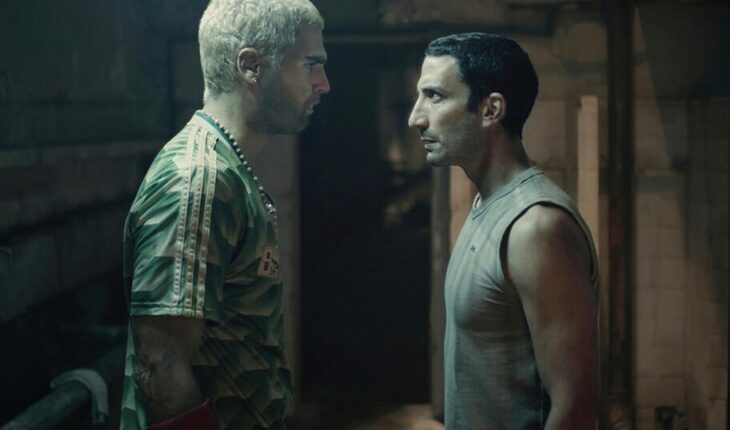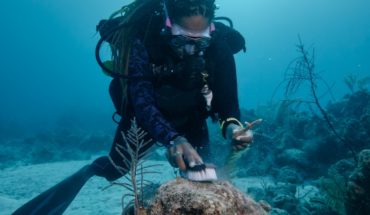You have to have a stomach but also a heart to see “El Marginal”. Because although the fourth season arrives it could well be said that there is nothing new under the sun, rather inside the prison in which the series takes place, its creators always manage to give it some twist and thus get the greatest possible impact and continue stirring a couple of guts on both sides of the screen. The famous voltage of scenes that proposes to increase the violence with the passage of the episodes. Pastor had already warned us (the return of Juan Minujín to the character, now also as a producer), or rather Miguel Palacios, at the end of the third season: “Welcome to Puente Viejo, welcome to hell. Concept that the 4 wants us to leave us starting with a first chapter that lasts more than an hour and that is unbearable in the level of rawness of its scenes. Let’s stop in parts. After two seasons that were prequels of the first – chronologically goes season 2, then 3 and finally 1 and 4 – the episodes recently arrived on Netflix should begin to unite the loose links that were left back in 2016.Thus, this episode 1 begins to take care of telling how Miguel / Pastor ends up in the same prison (again) as the Borges, after attempting to murder each other with Diosito (Nicolás Furtado). Since the escape from San Onofre, the former policeman convicted of homicide, executes a failed escape plan with Emma Molinari (Martina Gusmán), and the two children: Mica, the baby they had together, and Lucas, his son from his previous relationship with Silvia (character of Julieta Zylberberg, who also returns and who left the family and was admitted to a rehabilitation center); but he is arrested with a huge deployment of officers, a scene that puts us before the magnitude of a Netflix production (which unlike its previous ones, collaborates in the assembly), and with it of the remarkable in that level of effects and action scenes that is this new installment. And consequent act: life imprisonment and new prison. In Puente Viejo things do not seem to be very different from San Onofre but they are taken to the extreme. In the words of Mario himself (Claudio Rissi): “This is going to be 20 San Onofre. Pastor’s premature arrival does not go down well from any front: for the police he is a deserter, for the inmates he is “rati”, for César (Abel Ayala) -who also went there, along with Arnold (Emanuel García), still at risk that the gunshot wounds left by Borges will be revived-, a traitor. Except for Brian (Ignacio Quesada), a young man also a newcomer, whom Miguel protects the first night, when a couple of inmates kidnap him to abuse him. The price: spend a month in the “mailbox” and another series of physical punishments, from which he manages to escape by entering a new consumption.
Rodolfo Ranni as Benito Galván | Photo: Courtesy of Netflix
As I said, things in Puente Viejo are not much different. The Borges de Antín (Gerardo Romano), who is now Secretary of the Nation, is Coco (Luis Luque), the VIP inmate of the prison and who operates with his family: composed of his son-in-law, Bardo (Ariel Staltari), his sons Enzo and Caspa, and the girlfriends of both, Cielo and Alelí. However, the main difference is Benito Galván (Rodolfo Ranni), the director of the federal penitentiary establishment, former doctor, and within the prison, a dictator, with all that that entails: he subjects the inmates to all kinds of physical reprisals to maintain the façade of discipline. In the sense of the stories of the characters, although there are recurrences (such as how quickly the Borges and their negotiators are accommodated), it should be noted that the threads are well taken up: the reappearance of Silvia in the life of Miguel, Capese as the right hand of Antín, a Little God who does not finish closing his feelings for Pastor, Gladys (Ana Garibaldi) buying a chalet, Antín fleeing with the money and looking for how to accommodate herself after the political party she joined lost the election. In this fourth season, not only do the paths of the characters converge, but everyone’s goes to a different side, or almost. While the Borges will go for their classic modus operandi – as in season 2 with Roly Serrano’s Toad – to dethrone Coco; Pastor focuses rather on surviving for his own, and Arnold insists that Caesar execute his revenge. However, the plans do not go precisely as they are devised, right? Crime and Punishment
And so it was with the passage of the seasons: in the first, the finger on the food, the rape, and seeing that the Borges were able to cause a fire with all the inmates inside because as Mario said to Diosito so “we discarded the garbage when he was a child”; in the second, the Toad is facedThe closure of the first chapter is quite strong, to the point of wondering how far a human being is able to endure. What it lacks of plot development (since it becomes quite recurrent and almost without interesting narrative twists: the Borges seek to settle in the prison, Pastor escape and the Sub 21 disintegrated, never has luck), seeks to compensate in visual impact, in the tormented of his images well accompanied by an excellent art set (as is the recreation of Puente Viejo, the first season that is not recorded in the former Prison of Caceros) and a remarkable production like everything that comes from Netflix. But also, it seeks to compensate with a brutality taken to the extreme, because it goes beyond simply de-Romanticizing what is lived inside the prisons. And I say “taken to the extreme”, because if it does not shake, it does not impact, and if it does not impact it seems that the audiences are not reached. So the attractive becomes the morbid and how much darker can it become while the seasons continue to pass? It’s a question I ask myself. Because although one knows, when the episode is being played, that she is watching a fiction, it does not stop going through your head: how much of what they show us happens in prisons in Argentina? And why do we keep watching and even expectant to the premiere? Man through darkness to see the light is one of the central themes of this season, in turn crossed by one of the most important texts of literature: The Divine Comedy, by Dante Alighieri, to reflect on the passage of men through life through various stages, looking for the end of the tunnel. Rather literal metaphor if we remember the notes of a former prisoner that Pastor finds and how he wants to execute the escape plan. Moreover, bearing in mind that the prison was built on the foundations of an old bridge, like the paradox in which Brian repairs.” Those of us who are here are the youngest, the big ones always win,” says a passage from Dante’s work, which not only reflects the inequality over the criminals in suits and those in the neighborhood, but in turn the structure of Puente Viejo. If you look, the prison is built in the form of a building, with internal balconies. The higher up, the better. The lower down, the darker the abyss. That’s where this fourth season is eschatological, resorting to the somewhat infallible clique of good and evil, of light and shadows. Faith operates as a capacity to subsist but at the same time as the twisted code handled by the greatest murderers in history. It is enough to remember the links of the Military with the Church in the Dictatorship, and even the head of the Clan, Archimedes Puccio, prayed before dinner having hostages locked in the other room. Think of the director Galván, who is not for nothing called Benito but as Mussolini, nor for least the prisoners call him Mengueche, after Josef Mengele, the doctor who tortured and experimented “in the name of science”. “What is not tackled in time grows crooked,” says the former doctor (another coincidence with the Nazi) using Diosito’s teeth as a reference. To another extent, Coco develops a substantial mystical delirium – she prays before dinner and crucifies her victims – while Bardo has his Saint Sebastian, protector of souls who believe clandestinely, of those who do not hide their faith, of souls who resist pain, and there are even those who say that he was taken over by the LGBTQI+ community. for the representation of his naked figure, since the Renaissance.
San Sebastian in “El Marginal” | Photo: Netflix
In addition, this is the first season to show a prison priest, Father Ramon (Ernesto Larrese), one of the many vocations of service of the clergy. However, another of the lines that leaves a dialogue with Galván is if the priest is there and silences the atrocities of the director of the prison, because he also silences his own, abuses in the Church, perhaps? As for hell – which we had left from the beginning to retake – in addition to being an impassable place, it is punishment, the fate of wandering souls, or as the Colombian James (Daniel Pacheco Bautista) says, of the “social scum”. A term recontra associated with the economic class, in addition to the atrocities they commit, of course. And this is what the series points to with the character of Ranni, a perverse in all its anatomical structure.—Cogés o te cogen—, Borges would limit, as his motto of survival and phrase that he says to Diosito newcomers to San Onofre. And it is that violations, physical and human rights, are another great issue in this season, which once again leave us wondering if prisons should exist? Until what conditions is human to live? Where do the rights and guarantees start? And in that reduce to the most bestial and primitive toThe human being to the point of stripping him of his clothes, precisely one of the most social and cultural conditions that make him a man in his dignity and integrity, is that an animalization of the characters is proposed. Inside doors: how many of them look like people? Civilization and barbarism, Sarmiento would say.” I lock up a dog that I release to live”
On the other side of the courtyard, of the privileges, of the Borges, is a Cesar very hurt by the fire in San Onofre. A child who wants to rescue himself, finish high school, works as the only character that leads to deconstruct that no child is born jet and to think if there is any possibility of a possible future for the inmates. And in that way, the only character capable of providing hope within such brutality. Even falling in love? well in that is also Pastor, but mainly Bardo.—If he gives you the naphtha to love me, he has to give you the naphtha to put the breast; when one really loves, he plays it for the other, even if your life goes away,” says the character of Staltari, whom I celebrate, has run from what we are used to seeing.
Ariel Staltari as Bardo | Photo: Netflix
One that manifests that feeling trapped beyond being in prison, because in society there are other prisons, and marginalization occurs as soon as you feel that you can be separated. And it is with all that fear, but at the same time embodying the typical violent one because it is part of his own repression, that Bardo lives with desire. A quality that highlights/distinguishes him from the rest of the characters. In that world of males who insult each other and provoke the qualifier of “putito”, it is interesting and necessary to see the proximity, and the sex-affective interest of men with men. Like what Diosito feels for Pastor, a well-posed plot line in the brilliant first season, which now continues. The tenderness that Diosito generates is another of those breaks to so much violence: achieving that we can see a boy living in the body of a highly disturbing subject. It’s those grays that humanize the characters, but if they’re “bad guys”? Justly. Yes even the Angel Robledo Puch cries. “Pain is paid for with pain … and guarantees the criminal his fate,” wrote Luis Ortega (director of the film and brother of Sebastián Ortega, creator and producer of this series) in the prologue of the book. It applies perfectly to “El Marginal”. Vulnerability and nudity is another storyline. A naked man is an exposed, vulnerable man. And a man as such, in this hetero-patriarchal system, cannot be vulnerable or violated. In this sense, seeing male nudes on stage is celebrated, one for this reason, and another to stop naturalizing to represent only female bodies on the screen, because of the sexualizing history to which they were subjected. Here is a theme: who are the strong and who are the weak? What are the signs of weakness or strength? How many ways is the human being able to reach the lowest funds (the crux of Victor Hugo’s Les Miserables)? Diosito says it: “I’m tired of living always taking care of my ass.” “It’s what we have to do, it seems,” James replies.This brings us to another of the dilemmas of the series, which is the family. The other institution (beyond the penitentiary system). Emma tries to support a family, Coco does not operate if it is not with her family, the maxim of Mario Borges (like that of the Godfather) is the family, we begin to know something about James’ family, James along with Barny are also family, for Cesar part of his family went with Pedrito Pedraza, and Bardo feels “cohartado of his freedom” maintaining the bond with the mother of his daughter.
Martina Gusmán and Juan Minujín in “El Marginal 4” | Photo: Courtesy of Netflix
Let’s talk about Emma playing a role like Penelope, waiting for the odyssey of the (anti)hero. The role of the social worker seems to be reduced to the one that only works in the plot more than as emotional support of Pastor, as the woman in her role as a woman: waiting and taking care of her children. However, she is also the one who gives meaning to the motives of the former policeman, because without her, without clinging to a penalty, there would be no purpose for her to continue trying to survive a life sentence. On the other hand, this season, she will also explore an unknown past of hers, more about her father and leaves her destiny latent for the already confirmed fifth season. As another personal opinion: I celebrate that Brian Buley has been summoned again even in cameos, given the emblematic of his character, apart from that he always brings charisma to the scenes. For Diosito things are not going well and his structures are broken a lot, but I think this seeks to prepare the character for the new episodes perhaps, managing everything so that Mario gets out of the prison, having his own criminal gang (here he throws theory) or directly and the most unverifiable, leaving everything to start from scratch. Once again “El Marginal” offers us a good acting potential of an Argentine product, so famous that it even collected remakes in other parts of the world such as “El recluso” in Mexico. And at this point, six years after the creation process of the winner of the Martín Fierro de Oro (2017, which began broadcasting on Public TV), I am in a position to say that her characters were among the most beloved of argentine audiences. And that’s part of the reasons why we keep watching. Because in that darkness in which the characters are abandoned, we do not leave them alone and even (far from justifying or judging) it is possible for us to become fond.





